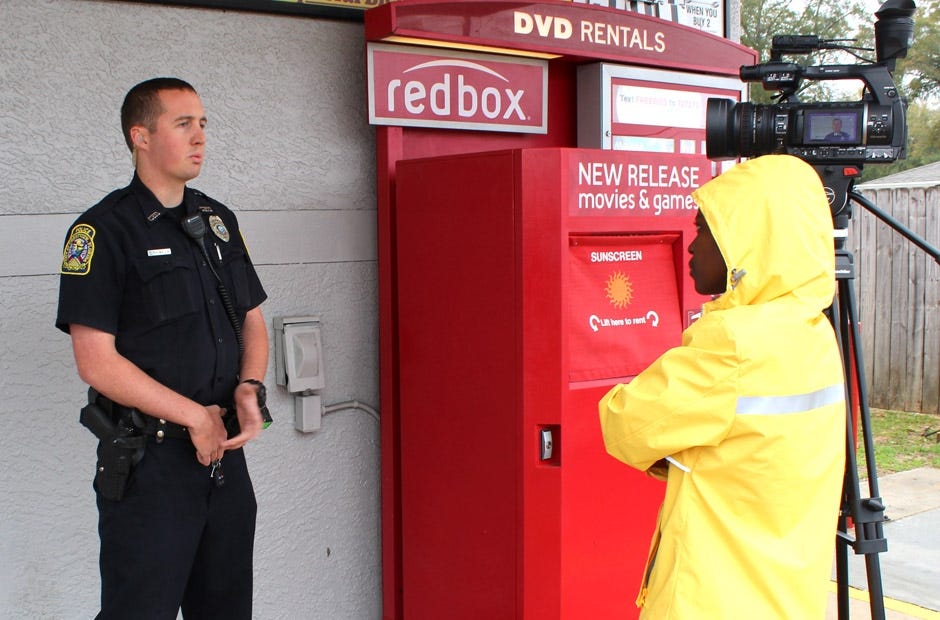![Crestview Police Officer Tyler Thomason discusses with WKRG-TV reporter Patrice Nolan the agency's efforts to combat illegal drug use in the city. [Brian Hughes | Crestview Police Department]](http://127.0.0.1/wordpress/wp-content/uploads/2022/01/ghows-DA-4a8ab6ac-ea6a-5878-e053-0100007fa9b8-99beeb7d.jpeg)
CRESTVIEW — There's a killer on the loose in the community and the Crestview Police Department needs the public's help in stopping it.
As if heroin wasn't bad enough, unscrupulous illegal drug dealers are enhancing it with the painkiller fentanyl, sometimes without their customers' knowledge.
"This is bad stuff," Police Chief Tony Taylor said. "Really bad stuff. People are dying from it right here in Crestview."
Narcotics investigator Sgt. Don Howe said three people have died at North Okaloosa Medical Center from opioid overdoses within the last three months, the latest being a 23-year-old man who did not respond to a drug called naloxone—often sold under the brand name Narcan—that counters the effects of the narcotics.
"Opioids attach themselves to receptors in the brain," Howe explained. "That's what gives users the high. Narcan slaps the opioid out of the receptors and fills that void. That kills the high and gets the user breathing again, because opioids depress the respiratory system."
While Crestview Police officers have previously used injectable naloxone, marketed as Evzio, to counter a heroin overdose, its manufacturer, Virginia-based Kaléo Pharma, has raised the price 500 percent from $690 two years ago to $4,500 at the end of 2016, putting it out of the range of CPD's budget.
"And it expires in a year," Taylor said. "So even if we could afford it, if we didn't use it up within a year, we'd end up throwing it out."
"Naloxone's price increase is part of an overall trend of increasing prescription-drug prices for both new brand-name drugs and old, off-patent generics," Drs. Ravi Gupta, Nilay D. Shah, and Joseph S. Ross stated in a December 2016 New England Journal of Medicine article titled "The Rising Price of Naloxone — Risks to Efforts to Stem Overdose Deaths."
But in cases where fentanyl is mixed into the heroin or cocaine, the problem of price gouging becomes moot. Naloxone has no effect.
"It blocks the Narcan," Howe said.
And there's also another problem.
"Increases in synthetic opioid-involved deaths are being driven by increases in fentanyl-involved overdose deaths, which are likely due to illicitly-manufactured fentanyl," the federal Centers for Disease Control and Prevention states on its website.
In other words, dope dealers are making their own version of fentanyl, and there's no guarantee how pure it is, nor how clean the manufacturing facilities are.
"Illicitly made fentanyl has been reported as the primary driver for increases in both fentanyl encounters (with law enforcement) and fatal fentanyl-involved overdoses," the CDC website states.
While federal data for Florida and Alabama is unavailable, the CDC reports neighboring Georgia saw a 64.7 percent increase in fentanyl overdose deaths between 2014 and 2015, and South Carolina experienced a 43.5 percent increase.
Even without data on local fentanyl use, patrol officers know the drug is being sold and used in Crestview. And unlike heroin or cocaine, the antidote doesn't work for it.
"More people are going to die from this stuff unless other people step up and tell us where it's coming from," Taylor said. Residents can anonymously report suspected drug dealers to the Crestview Police at 682-2055, or Crimestoppers, 683-TIPS (8477).
The United States is in the midst of an opioid overdose epidemic.
Fentanyl is a synthetic (man-made) opioid that is 50 times more potent than heroin and 100 times more potent than morphine. There are two types of fentanyl:
•Pharmaceutical fentanyl, which is primarily prescribed to manage acute and chronic pain associated with advanced cancer.
•Non-pharmaceutical fentanyl, which is illicitly manufactured, and is often mixed with heroin and/or cocaine—with or without the user's knowledge—in order to increase the drug's effect.
Source: Centers for Disease Control and Prevention
What is fentanyl?
This article originally appeared on Crestview News Bulletin: Synthetic opioid making inroads in Crestview
